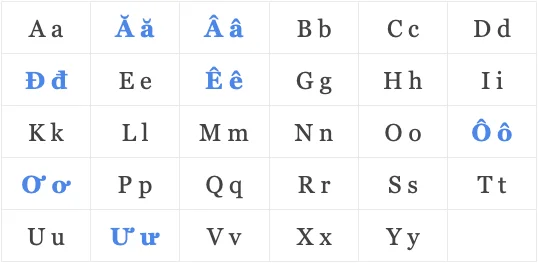Vietnam is home to 54 ethnic groups, each with its own unique language and culture. But is there a single official language uniting the nation? Join Thao & Co. to find out what language is spoken in Vietnam right in this article.
According to Ethnologue, there are currently 110 distinct languages spoken in Vietnam. This includes:
Here are some interesting facts about these languages:
The official language of Vietnam is Vietnamese. Its written form, chữ Quốc Ngữ (also called chữ An Nam), became officially recognized on January 1, 1882, when the French colonial government mandated its use in all official government activities.
Since then, chữ Quốc Ngữ has undergone numerous challenges and transformations before being firmly established as the national language.
The origin of Vietnamese has been a subject of much debate over the years. Here are two prominent theories:
In the 10th century, Vietnamese people created Chữ Nôm, a script based on Chinese characters, to resist assimilation efforts by China and preserve their mother tongue.
In the 16th and 17th centuries, Western priests introduced the Latin alphabet for transcribing Vietnamese. Among them, Alexandre de Rhodes, a French priest and lexicographer, played a pivotal role in perfecting the transcription system.
Over time, this Latin-based script was refined and standardized, becoming the foundation of modern Vietnamese. Today, Vietnamese is widely used both within Vietnam and by Vietnamese communities worldwide.

The Vietnamese language is known for its unique features, which include:
These characteristics make Vietnamese a unique and expressive language. However, they also pose potential challenges for translators.
Without a deep understanding of both the Vietnamese language and its cultural nuances, translations can easily come across as awkward or inaccurate.
1. English: According to statistics from the Ministry of Education and Training of Vietnam, there are currently 10 million English learners at schools and language centers in the country. It’s also widely used in workplaces, reflecting its importance in education and professional settings.
2. Chinese: Chinese is popular among Vietnamese speakers due to its linguistic and cultural similarities with Vietnamese. On social media, Chinese learning groups attract a massive following, with some having over 700,000 members.
3. Korean: Thanks to the Hallyu Wave (Korean cultural influence), Korean has gained significant popularity in Vietnam. According to Le Quan, the director of Hanoi National University, Vietnam has the largest-scale Korean language education system in Southeast Asia.
4. Japanese: Japanese is often studied by Vietnamese learners seeking educational and employment opportunities in Japan. As of 2018, there were 174,000 Japanese learners, and this number continues to grow.

1. Tày language: Spoken by the Tày ethnic group, the language has 1.8 million speakers, primarily in Lạng Sơn, Cao Bằng, and Bắc Kạn provinces.
2. Thái (Tai) language: According to statistics from 2019, there are over 1.8 million Thái people in the northwest region of Vietnam.
3. H’Mông language: With 1 million speakers, the H’Mông language is predominantly spoken in the northern regions of Vietnam.
4. Khmer language: The Khmer ethnic group has around 2 million speakers, who use three distinct dialects: Khmer Trà Vinh, Khmer Sóc Trăng, and others spoken in different regions.
Vietnam has only one official language: Vietnamese.
While English is the most widely learned foreign language and is commonly used in many industries, it is not recognized as a second official language.
For most Vietnamese people, learning English is seen as a way to expand career opportunities and enhance personal growth. However, English does not replace or function alongside Vietnamese as a national language.
Additionally, English is not universally spoken across the country. In rural and remote areas, many people remain unfamiliar with English or any foreign language.
Thao & Co. have explored the question, “What language is spoken in Vietnam?“
The journey of chữ Quốc ngữ and the Vietnamese language has been one of resilience and transformation, shaped by centuries of history. It is the responsibility of every Vietnamese person to protect, preserve, and promote their native language as a vital part of their cultural heritage.
For more fascinating insights, visit our Translation Times page to explore a wide range of topics!